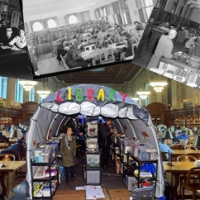If You Want to See the Sharing Economy…Go to the Library
The value of sharing is one instilled in us from a young age: from the parental injunction to share with our siblings to the early socialization received in kindergarten. Sharing acts as a baseline introduction to the principle of mutual aid, an early lesson that just as we would hope others would share with us, so too must we be willing to share with them. It is not that sharing is totally a selfless value, but that it locates the individual self in relation to others. Granted, it is generally construed more as a social or ethical value than an example of something linked to a basic monetary value.
When everything has a price tag on it there is something alluringly radical about the idea of sharing. Yet this need not be a utopian longing or a quixotic fantasy – if we want an example of large scale sharing in action we need look no further than the local library.
***
The idea of sharing often works in tandem with things that are not thought to be expressly private property – thus part of the reason we are taught to share is that just as it is not “owned” by another, it is also not “owned” by us. We share, so that others will share alike. Yet, it is too simple to fully remove sharing from the idea of things that one person owns, for we regularly share things we “own:” we share food, we lend books or clothing, we offer to drive people, we offer a traveling friend of a friend a couch for the night, we share our time, we share our skills, and so forth. While things held in common (or “commons”) may in and of themselves represent a demand that they be shared, our daily lives are replete with numerous moments where we share that which is ours. And in most cases we expect relatively little – if anything – in return.
The value of sharing is not a monetary one; however, this does not mean that there is not a way to extract monetary value from sharing (or at least from appropriating the term “sharing”). The challenge with sharing tends to be that we encounter it in rather localized forms within the context of small personal networks: a person offers their couch (or floor) to a friend of a friend. Yet modern communications technologies provide inexpensive tools for the connection of these personal networks into the larger networked world. Thus a range of websites and services emerge that seek to connect those with things to “share” with those who are looking for such things (with a notion of “paying it forward” either explicitly or subtly at work).
Sites for companies like Airbnb allow people to “share” their abodes with prospective travelers, while companies like Uber allow people to “share” their driving services. Though in these prominent cases of, what has been called the “sharing economy” there tends to be an exchange of payment, less in terms of “I’ll cook you brunch” or “I’ll help you move in two weeks” than in terms of “here is X amount of money” in exchange. Clad in friendly if somewhat precious and precocious if somewhat hip websites these sharing sites (or “collaborative”) displace the bland market face of impersonal hotels or taxi companies with something personal, just as we can now push aside the cultural gatekeepers of old by directly crowd-funding the projects we want.
As slick advertising campaigns, fawning op-eds in major newspapers, TED talks aplenty, and mountains of profits attest there is lots of monetary value to be mined from the “sharing economy.” Yet for all of the barriers that are apparently broken down and impressive “collaborative” or “peer to peer” or “sharing” apps/sites/organizations – it often seems that when it comes to the term “sharing economy” the word “sharing” primarily acts as a prefix to distract from the fact that the emphasis remains squarely on the economy. After all, though some of these projects may have humble origins based in a genuine notion of getting past market relations – what tends to occur is that the “sharing economy” is just another way of letting people rent what they have and are not using. Don’t need your apartment for the weekend? Rent it out. Have a car that you are willing to use as an improvised taxi? Go for it. But when the monetary exchange (“that’ll be X amount of money”) is at the forefront (as opposed to an offhand offer of “are you sure I can’t pay you?”) it is questionable how much of what is occurring is really sharing and how much is just renting. There is a difference between offering to share something and offering to rent something. The impressive market values of many of these “sharing” companies further demonstrates the ease with which “sharing” can be turned into a profitable business.
The ideological logic at work is tricky but not hard to detect: at the moment, many subway stations (and subway cars) in New York City are plastered with advertisements for Airbnb that boast “Airbnb is good for New Yorkers” – and regardless of the veracity of this claim the overwhelming sub textual truth is that New Yorkers are very good for Airbnb. As good as the “sharing economy” may appear to be for individuals, those who are benefiting the most are not the ones who are “sharing” but those who get an impressive share of the profits. The “sharing economy” works well for generating money precisely because it acts in spheres that are not genuine commons (one feels less compunction about renting that which is not communally owned [hence the trouble for new “sharing” companies that try to rent things like publicly owned parking spaces]). Yet what these companies demonstrate is that technological savvy allows the market to enclose the personal as well as the public.
This is not to wholly dismiss of the potential for new communications technologies to connect people in ways that enable genuine sharing; however, it is meant as a reminder that just because a for-profit company casts itself as “sharing” does not mean that their definition of the term matches with what most of us think of when we hear the word “sharing.” There is clearly great value in sharing, but there is also something quite radical about the idea of sharing – about the notion that we can relate to each other in a way that is not wholly determined by money.
The great humor about the “sharing economy” is not in its name, but in the notion that this all represents something innovative, disruptive, and new. Alas, what may be innovative, disruptive and new is simply the way in which many companies have figured out a way to get monetary value out of a longstanding social value. The term “sharing economy” is a wonderful feat of public relations branding, but the idea of an economy that emphasizes the value of sharing is not as far-fetched as it may at first seem.
Libraries, after all, were demonstrating what a sharing economy looks like before there was “an app for that.”
***
In contemporary capitalist societies, libraries stand out as slightly odd. While people are generally accustomed to going into a store and having to pay if they plan on leaving with something – in a library this relationship is quite different. When one goes to the checkout counter in a store one hands over money, when one goes to checkout at the library one simply notifies the staff what items are being borrowed. Though the library may appear to be free, the truth is quite different; it is not that the library borrower is getting things for free, it is that they have already paid. Libraries are the result of a community pooling resources (often gathered through taxes) for the funding and purchasing of materials that are then made available to all members of that community. While the definition of “community” may vary from library to library and come with certain limitations (consider: academic libraries as distinct from public libraries) – the term does not necessarily require exclusivity. Networks of inter-library loan programs, for example, put the resources available at one library within the reach of numerous other libraries.
Just as a community invests in infrastructure like roads, bridges and water management systems – a community invests in a library. Libraries, if you will, represent educational and intellectual infrastructure. A recognition that just as a road makes it easier to reach your destination, so too does access to information enable one to complete a journey of another sort.
Libraries function as commons – places which no one library user genuinely owns, and thus all users share ownership. Furthermore, the items that one encounters in a library are generally ones that enable and encourage sharing. For all of the aesthetic appeal of a shelf filled with books, a book is at its most useful when it is being used (being read) and sharing books is simple to do – libraries have been doing it for hundreds of years and they did not require sleek apps to do it. This is doubtlessly one of the reasons why libraries have a tendency to pop up as part of protest movements. Yet libraries offer much more than just books – including providing Internet access – and all of these are made available in a format that does not expect an individual to pay for a specific item as such (though late fees do exist) but that involves an individual in a structure where the emphasis is on the sharing of resources.
The monetary costs associated with libraries should not be overlooked – and yet the element to recognize is that what occurs in a library is the development and maintenance through the economy of a genuine structure for sharing. Numerous people contribute a little and from this are able to get a lot, but the value they extract from their investment is not in the form of a sack of money with a dollar sign on it, but a larger social value. It is a value that would be diminished by turning it simply into a profit-generating scheme. If a library were a place that one could rent books, or rent time on a computer – than the library would be no different from an Internet café or a “sharing economy” website. It would cease to be a library in anything but name. Instead, libraries focus on genuine sharing – and as many a librarian or library budget can attest – when one is truly focused on sharing as a value instead of the value to be pulled from sharing to look for profit is to miss the point.
To restate: the true value of sharing is not monetary, it is the recognition that there are some things more valuable than money.
Long before the business press had given its approval to the term “sharing economy” there were those who saw in libraries’ sharing ethos a quality that could be applied to things beyond informational resources. In the book Tools for Conviviality (1973) the philosopher Ivan Illich observed that a library functioned as a prototypical example of an alternative way for people to organize their communities and access to tools – a convivial notion of sharing instead of a notion of buying and selling. While libraries may have developed into their present form due to their early linkage to items that encourage sharing (books, knowledge), Illich recognized that the liberating potential could be extended to many other resources. As Illich wrote:
“Repositories for other learning tools can be organized on its model, expanding access to tapes, pictures, records, and very simple labs filled with the same scientific instruments with which most major breakthroughs of the last century were made…We should learn to ask first what people need if they want to learn and provide these tools for them.” (65)
While Illich clearly links the library to the importance of learning, and predicted that libraries would offer audio-visual materials as well, the key element in the above quotation is his ideas around “simple labs” and the notion that a society can “provide these tools.” What those points elucidate is that the sharing function of a library can extend into many areas, making available many diverse items and services – all the while expecting only the sort of remuneration that allows the value to be carried forward for the society as opposed to being carried away into an intermediary company’s bank account. A library may not offer an impromptu taxi-like-service and it may not offer people a place to stay for the night – but the model that libraries represent acts as a reminder of how an economy based on the principle of sharing actually looks.
Furthermore what a library can represent – as Illich suggests by writing “we should learn to ask” – is that the sharing function of a library can be continually expanded to meet the needs of those served by the library. It need not be limited to the tools that are traditionally associated with libraries (like books). Thus, a higher level of sharing becomes visible in that it ceases simply being a matter of “share what you’ve got” and encourages people to consider their larger needs and the needs of their community. After all, it is not a great stretch to imagine that a resource that one person may be interested in could be useful to others. Libraries provide a prototypical example of a way that this can be done at a large scale that can then connect with other libraries to further expand access to these varied resources. It is this expansion of available “tools” that truly expands the basic functioning of a library into something socially transformative – granted, the library’s focus on the value of sharing has always been socially transformative.
The importance of sharing is not new, and neither are organizations that recognize its importance.
***
Sharing is a value-laden idea.
Evidently, sharing is also a value from which profits can be ladled, but in such a case is what remains genuinely sharing or simply renting with a hip haircut? There is something alluring in the notion of an economy organized in such a fashion that collaboration and sharing are emphasized, but this requires a recognition that the value of sharing is precisely in the way in which it transcends and resists attempts to simply monetize it. The so-called “sharing economy” demonstrates the way in which the market has found a way to make “sharing” work for it.
But if you want to see a real example of a sharing economy that works: go visit a library.
Works Cited:
Tools for Conviviality. Ivan Illich (Harper & Row, 1973)
Related Content:
Modeling a Different World – The Library and Prefigurative Politics
Librarian is My Occupation – A History of the People’s Library of Occupy Wall Street
Books – A Tool for Conviviality
Librarian is (still) My Occupation – Another Epilogue




!["The Tree of Science" an English translation of Eugene Huzar's "L'arbre de la science" [Part 2]](https://librarianshipwreck.files.wordpress.com/2020/10/gustav-dore_the-new-zealander.jpg?w=200&h=200&crop=1)






Pingback: The Faucet Goes Dry in Detroit | LibrarianShipwreck
Pingback: The Laboratory or The Library? | LibrarianShipwreck
Pingback: Si quieres ver la Economía del Compartir … Andá a la Biblioteca | blognooficial
Pingback: How to Avoid Ruining a Book | LibrarianShipwreck
Pingback: Looking for the Best Deals on Black Friday? (try the library!) | LibrarianShipwreck
Pingback: (Libraries and/or Archives) + fire = bad | LibrarianShipwreck
Pingback: Evidently, Democracy Disrupts the Disruptors | LibrarianShipwreck